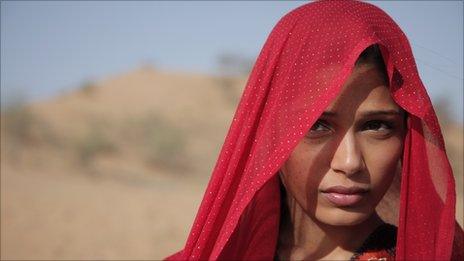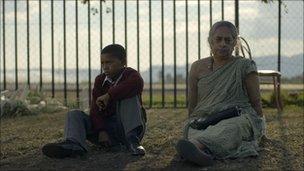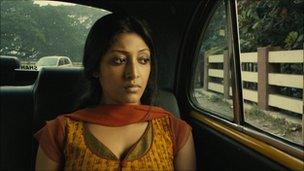A taste for India in world cinema
- Published

Trishna is based on Victorian author Thomas Hardy's novel, Tess of the d'Urbervilles
India seems to be the flavour of the season in the global film industry. Film critic Saibal Chatterjee reports on a taste for the exotic from the recently-concluded Toronto Film Festival.
The world is clearly in search of another Slumdog Millionaire - Danny Boyle's ode to the "never say die" spirit of Mumbai (Bombay).
Four of the films at the 36th Toronto International Film Festival (Tiff) were either set in the subcontinent or touched upon India-related themes.
Toronto is where Slumdug Millionaire began its all-conquering journey when it won the Cadillac People's Choice Award, before going on to sweep the Oscars, Golden Globes and Baftas.
The most heralded of the India-themed films at the festival this year was Trishna by prolific English film-maker Michael Winterbottom.
Earlier this year, Winterbottom told an Indian news agency that it was easier to get funding for a film if it had an India connection.
Trishna transports Thomas Hardy's late Victorian novel, Tess of the d'Urbervilles, from 1890s England to contemporary Rajasthan with mixed results in terms of artistic achievement as well as emotional impact.
'Spirit of India'
However, purely as a narrative experiment, Trishna is as daring as anything that the adventurous Winterbottom has ever done.
The film, due for release later this year, has attracted largely positive reviews from Western critics.

Lucky is a 'wonderful, little gem'
"Trishna is infused with the spirit of India. Winterbottom is able to convey the tensions in a complex nation that respects traditional values and yet rushes to embrace all the liberties and luxuries of a booming modern economy," a Screen International review said.
The film features Freida Pinto as an arresting Indian version of the low-born country girl Tess Durbeyfield and British actor Riz Ahmed in a role that condenses the two principal characters in the Hardy novel - the duplicitous Alec d'Urberville and the pure Angel Clare - into one.
Winterbottom has said that he found several aspects of Rajasthan that were "similar to the world that Hardy describes".
"It's about rural communities that have been very conservative, very fixed, very traditional, and then it's the impact of new technology, education, communication... That's what Hardy is writing about in Tess and that's very much what's happening in India now," he told Screen Daily.
Winterbottom's tragic heroine belongs to an impoverished family in rural Rajasthan, where her father drives an auto-rickshaw for a living. A road accident destroys the vehicle and her father sustains grave injuries.
As a crisis looms, the England-educated son of a wealthy hotelier is smitten by Trishna and gets her a job in his father's hotel in Jaipur.
His relationship with the girl seems pretty altruistic at first but it gradually degenerates into a bond characterised by resentment and exploitation.
But Trishna is no Slumdog. Nor is Trivedi's specially commissioned musical score a patch on AR Rahman's.
Tribute to Bengal
Another film in the festival was a Canadian production, Robert Lieberman's Breakaway, a sports film with the soul of a Bollywood musical.
Breakaway is about a cocky Indian youngster caught between his single-minded passion for ice hockey, his adoptive nation's favourite sport, and his traditional immigrant family's more sedate expectations of him.
"Breakaway tells a universal story. It is about anybody who comes to a new country and seeks to assimilate himself," says director Lieberman.
Two markedly smaller in scope but infinitely more nuanced films unveiled in Toronto this year also had India at their heart: Indian-British forensic psychiatrist and film-maker Avie Luthra's Lucky set in Durban in South Africa and Sri Lankan director Vimukthi Jayasundara's Bengali-language Chatrak (Mushrooms).
Lucky is a simple but profoundly moving portrait of humanity in fractious post-apartheid South Africa.
The tale is woven around a 10-year-old African village boy called Lucky who loses his mother to Aids. He travels from his remote Zulu hamlet to Durban, nurturing hopes of going to school. But the uncle he turns to for help stonewalls him.
Lucky strays into the home of an elderly Indian woman, Padma - played by veteran Bangalore stage and screen actress and Indian MP Jayashree Basavaraj.
The two do not understand each other's language and Padma makes no bones about her innate distrust of Africans. And yet an unlikely and unique bond develops between them. Despite all the odds, love triumphs over decades of racial segregation.

Chatrak is set in the city of Calcutta
Surreal universe
Jayasundara's characteristically quirky Chatrak is an Indo-French co-production set in the city of Calcutta and an unspecified forest location in West Bengal.
A successful architect just back from Dubai sets out in search of his missing brother who is believed to have gone mad and sleeps on a tree in the middle of a dense jungle.
In his own inimitable way, Jayasundara creates a surreal universe in which appearances are deceptive. The brothers have not met in years but, as it transpires, their affinity runs deeper than is immediately obvious.
The 34-year-old Paris-based director, who won the 2005 Camera d'Or in Cannes for his first film The Forsaken Land, etches out Calcutta in a manner reminiscent of Bengali cinema legends Satyajit Ray and Ritwik Ghatak, two film-makers he admires.
"It is my conscious tribute to the Bengali movies that were my first introduction to this culture," he says.
In addition to these four films, Academy award-winning filmmaker Ang Lee's 3D adaptation of Canadian writer Yann Martel's Life of Pi will hit screens around the world next year.
So will the Oscar-nominated and Palme d'Or winner Roland Joffe's Singularity, an epic period drama about the 18th-century Anglo-Maratha war starring Josh Hartnett, Bipasha Basu, Neve Campbell and Abhay Deol.
With the steady proliferation of India-bound international productions, Winterbottom's assertion that an India link helps attract cash is probably correct.